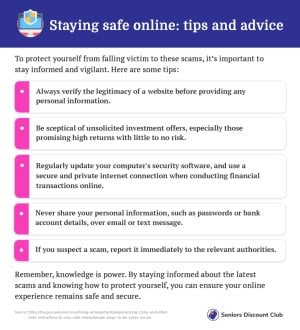ASIC just busted 2,500 scam websites! Are you safe?
In an era where the internet has become a breeding ground for scams and fraudulent activities, the Australian Securities and Investments Commission (ASIC) has taken a firm stand.
The regulatory body has successfully dismantled more than 2,500 scam websites, including those promoting investment scams and phishing schemes.
This significant achievement is a testament to ASIC’s commitment to safeguarding the Australian public from the perils of online fraud.
The success of this operation can be largely attributed to ASIC’s innovative ‘website takedown service’. This powerful tool allows the commission to either completely remove or restrict access to websites that are found to be malicious or fraudulent.
This initiative is part of the government’s broader ‘Fighting Scams’ program, which is designed to protect Australian consumers from the increasing threat of online scams.
The program also includes the newly operational National Anti-Scams Centre (NASC), which works in tandem with ASIC to combat internet fraud.
In a press conference, ASIC deputy chair Sarah Court explained the importance of this service.
‘We recognise that scammers rely on technology to perpetrate investment scams.’
‘This includes using sophisticated websites to trick Australians into believing they are making genuine investments.’
‘Our website takedown service helps us identify and disrupt investment scam and phishing websites from causing further harm to Australians,’ she said.
The many faces of online scams
The types of online threats targeted by ASIC are diverse, ranging from bogus investment schemes and crypto scams to imposter sites that mimic legitimate businesses.
These scams are often sophisticated and convincing, making it difficult for unsuspecting individuals to identify them.
The court advised Australians to exercise caution and be sceptical of opportunities that promise guaranteed and high returns with low risk. These offers, she suggested, might be too good to be true.
How to report suspicious online activities
If you encounter suspicious online activities, ASIC encourages you to report them. If you suspect an investment scam, you can report it directly to ASIC.
For other dubious activities, you can report to Scamwatch, a service run by the Australian Competition and Consumer Commission (ACCC).
We also encourage you to post on our Scam Watch forum if you ever come across a scam.
This way we can spread the word to our community about what scams are going around and what they need to keep an eye out for.
Understanding online scams: a closer look
Online scams have become increasingly sophisticated, often mimicking legitimate businesses and services to trick individuals into parting with their money.
Here are some common types of scams that you should be aware of:
1. Investment scams: These scams often promise high returns with little to no risk. They may involve investments in shares, real estate, commodities or other supposed 'opportunities'. Always be wary of unsolicited investment advice or offers.
2. Crypto scams: With the rise of cryptocurrencies, scams involving these digital assets have also increased. These scams can take many forms, including fake initial coin offerings (ICOs), pump-and-dump schemes, and fraudulent digital wallets.
3. Phishing scams: These scams involve attempts to trick you into giving out personal information such as your bank account numbers, passwords and credit card numbers. They often do this by pretending to be a legitimate company that you may deal with, like your bank or a social networking site.
4. Imposter websites: These are websites that mimic legitimate businesses to trick you into giving them your personal information. They often look very similar to the real website, using the same design and logo.
Staying safe online: tips and advice
To protect yourself from falling victim to these scams, it’s important to stay informed and vigilant. Here are some tips:

What are your experiences with online scams? Have you encountered any of these tactics before? Share your stories and tips in the comments below.
The regulatory body has successfully dismantled more than 2,500 scam websites, including those promoting investment scams and phishing schemes.
This significant achievement is a testament to ASIC’s commitment to safeguarding the Australian public from the perils of online fraud.
The success of this operation can be largely attributed to ASIC’s innovative ‘website takedown service’. This powerful tool allows the commission to either completely remove or restrict access to websites that are found to be malicious or fraudulent.
This initiative is part of the government’s broader ‘Fighting Scams’ program, which is designed to protect Australian consumers from the increasing threat of online scams.
The program also includes the newly operational National Anti-Scams Centre (NASC), which works in tandem with ASIC to combat internet fraud.
In a press conference, ASIC deputy chair Sarah Court explained the importance of this service.
‘We recognise that scammers rely on technology to perpetrate investment scams.’
‘This includes using sophisticated websites to trick Australians into believing they are making genuine investments.’
‘Our website takedown service helps us identify and disrupt investment scam and phishing websites from causing further harm to Australians,’ she said.
The many faces of online scams
The types of online threats targeted by ASIC are diverse, ranging from bogus investment schemes and crypto scams to imposter sites that mimic legitimate businesses.
These scams are often sophisticated and convincing, making it difficult for unsuspecting individuals to identify them.
The court advised Australians to exercise caution and be sceptical of opportunities that promise guaranteed and high returns with low risk. These offers, she suggested, might be too good to be true.
How to report suspicious online activities
If you encounter suspicious online activities, ASIC encourages you to report them. If you suspect an investment scam, you can report it directly to ASIC.
For other dubious activities, you can report to Scamwatch, a service run by the Australian Competition and Consumer Commission (ACCC).
We also encourage you to post on our Scam Watch forum if you ever come across a scam.
This way we can spread the word to our community about what scams are going around and what they need to keep an eye out for.
Understanding online scams: a closer look
Online scams have become increasingly sophisticated, often mimicking legitimate businesses and services to trick individuals into parting with their money.
Here are some common types of scams that you should be aware of:
1. Investment scams: These scams often promise high returns with little to no risk. They may involve investments in shares, real estate, commodities or other supposed 'opportunities'. Always be wary of unsolicited investment advice or offers.
2. Crypto scams: With the rise of cryptocurrencies, scams involving these digital assets have also increased. These scams can take many forms, including fake initial coin offerings (ICOs), pump-and-dump schemes, and fraudulent digital wallets.
3. Phishing scams: These scams involve attempts to trick you into giving out personal information such as your bank account numbers, passwords and credit card numbers. They often do this by pretending to be a legitimate company that you may deal with, like your bank or a social networking site.
4. Imposter websites: These are websites that mimic legitimate businesses to trick you into giving them your personal information. They often look very similar to the real website, using the same design and logo.
Staying safe online: tips and advice
To protect yourself from falling victim to these scams, it’s important to stay informed and vigilant. Here are some tips:
- Always verify the legitimacy of a website before providing any personal information.
- Be sceptical of unsolicited investment offers, especially those promising high returns with little to no risk.
- Regularly update your computer’s security software, and use a secure and private internet connection when conducting financial transactions online.
- Never share your personal information, such as passwords or bank account details, over email or text message.
- If you suspect a scam, report it immediately to the relevant authorities.
Key Takeaways
- The Australian Securities and Investments Commission (ASIC) has removed more than 2,500 investment scam and phishing sites.
- The success could be attributed to ASIC’s ‘website takedown service’, a part of the government's broader ‘Fighting Scams’ program.
- ASIC targets various online threats, including fake investment schemes, and crypto scams, and imposter sites.
- ASIC encourages reports of suspicious online activities, either directly for investment scams or to Scamwatch for other dubious activities.
Last edited:









